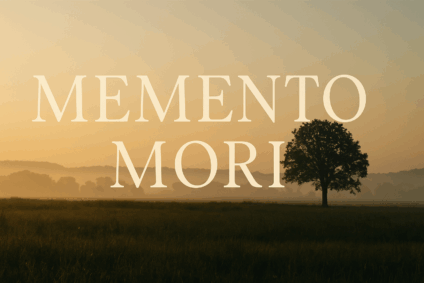The Gift of Memento Mori
 “You don’t know when the last time of something happening is. You don’t know what the last great day you’ll spend with your best friend is. You’ll just know when you’ve never had that day again.” -Greta Gerwig
“You don’t know when the last time of something happening is. You don’t know what the last great day you’ll spend with your best friend is. You’ll just know when you’ve never had that day again.” -Greta Gerwig
That line sparked me to write a post about some of my “Last Great Days. ” I wanted to discuss how time quietly sweeps things away and how we only recognize a ‘last time’ once it’s comfortably behind us.
That memory came back recently when my pastor, Rev. Magrey deVega, preached a sermon about nostalgia, the bittersweet ache of remembering what was, and how easily we forget to notice what is. I’d texted him that quote from my blog, and he replied: “Beautiful, John. Yes, indeed, may we savor each day and relish each moment, for Memento Mori, as the Stoics remind us. And may that liberate us to live our truest and best selves, by the power of the Holy Spirit.”
Memento Mori. Remember you must die.
Strangely and beautifully, Memento Mori fits hand in hand with the reflections I offered in another post of mine, My Creed, where I wrote: “I believe in the holiness of ordinary days… I believe in paying attention.” There’s holiness in a Wednesday. There’s beauty in the unremarkable. But we miss it when we think we’ll get an endless supply of those days. We won’t.
The Stoics believed remembering our mortality helps us align our lives with what matters. Seneca said, “You act like mortals in all that you fear, and like immortals in all that you desire.” We fear death but live as though we have forever. Memento Mori is a call to reverse that.
It’s also profoundly spiritual. The Psalmist prayed, “Teach us to number our days, that we may gain a heart of wisdom.“ Jesus often spoke of the importance of being present, urging us not to worry about tomorrow and to notice the lilies, sparrows, and neighbors in front of us. These are all calls to presence, groundedness, and grace.
Another line from My Creed comes to mind: “I believe that nothing is wasted—not tears, not time, not even pain.” If that’s true, and I still believe it is, then Memento Mori isn’t about making every day perfect. It’s about making every day real. Even the messy ones. Especially the messy ones.
What would change if we lived like time was a gift rather than a guarantee? Maybe we’d call the friend we keep putting off. Maybe we’d stop postponing joy until the house is clean or the project’s done. Maybe we’d apologize quicker and forgive faster. Maybe we’d linger over dinner instead of rushing through it. Maybe we’d say “I love you” more often—out loud, not just in our heads.
Memento Mori isn’t about dying. It’s about living, deeply and deliberately.
But here’s the hard part: sometimes, even knowing this, we still forget, get distracted, and let days pile up in sameness. And then, one day, a season is over. A child grows up, a friendship drifts, and a chair is left empty.
That’s the ache behind “The Last Great Day.” It’s not a tragedy. It’s the quiet sorrow of impermanence. And yet, hidden in that ache is a strange mercy. It reminds us that life is always asking us to notice it.
So here’s my quiet plea—for myself as much as anyone else. Let’s practice noticing. Let’s greet the morning with more reverence, even if it’s cloudy. Let’s treat the people in front of us like they matter because they do. Let’s hold space for the sacredness of the ordinary.
The truth is, we won’t know when we’re in the last great day until long after it’s gone. But we can decide, here and now, to make this one count—this moment, this cup of coffee, this shared silence, this overlooked Wednesday.
Memento Mori. Not to make us fearful but to make us free.

Pingback:Deep Something | “You Belong Every Place” — Stoic Wisdom and the Freedom of Self-Acceptance
Pingback:Deep Something | The Stoic Path I Didn’t Mean to Take
Pingback:Deep Something | Grief in Pieces
Pingback:Deep Something | Memento Mori: A Practice for the Living